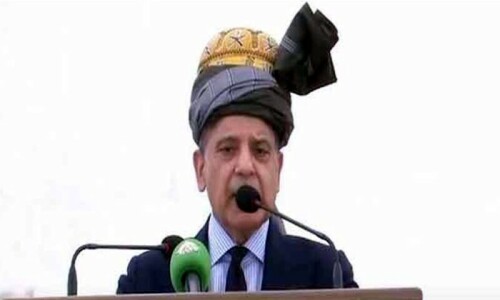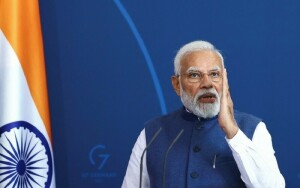IN the four-day military conflict between Pakistan and India, Pakistan was not only able to effectively defend itself but to also neutralise the Indian objective of imposing a military solution as a response to the Pahalgam terrorist incident. India’s effort to expand the space for conventional war below the nuclear threshold did not succeed. Pakistan was able to re-establish conventional deterrence and, by its counter-attack, raise the costs for India for undertaking a reckless military adventure.
This has understandably been celebrated in the country and helped to renew national self-confidence. But it is important now to move past the triumphalism and focus on preparing for the next challenge which is bound to come given the unremitting confrontational stance of Narendra Modi’s government and the fact that the situation remains tense. The risk of basking too long in triumphalism is that it can breed over-confidence and complacency when another, bigger challenge may lie ahead. In fact, the moment urges the need for hard thinking, hard planning and hard work.
Prime Minister Modi has, since the crisis ended, been stepping up his war of words against Pakistan and whipping up anti-Pakistan hysteria. In speech after speech, he has claimed India has established a ‘new normal’ by its military actions, and that any future terrorist attack will be deemed an act of war and responded to militarily by this ‘new’ doctrine. He has also made the Indus Waters Treaty (IWT) central to his threats against Pakistan. Modi has repeatedly said Pakistan will not get a single drop from ‘India’s rivers’ and vowed to make Pakistan “feel the heat”. Claiming the treaty was badly negotiated, he made it clear he intends to use water as a weapon against Pakistan.
Some of this inflammatory rhetoric is aimed at the domestic audience and is part of damage-limitation efforts after the unedifying outcome for India of its military action. Such aggressive rhetoric also has an obvious political purpose as it helps Modi burnish his anti-Muslim credentials. But his threats have to be taken seriously, especially as Modi has demonstrated he has an insatiable desire for confrontation with Pakistan. By all indications, India will keep up pressure on Pakistan and use coercive methods including threats of pre-emptive war and weaponisation of the water issue.
It is time to move beyond triumphalism for some hard thinking and hard planning.
Pakistan has to, therefore, be prepared to deal with a multi-front situation which means on the defence, economic and diplomatic fronts as well as in efforts to maintain national unity and cohesion. Military preparedness will obviously require identifying the gaps in defence, which may have been exposed in the latest crisis as well as areas of potential vulnerability in the next multi-domain challenge. This means upgrades of equipment that include air assets and missiles, as well as AI-powered electronic warfare and air defence capabilities, especially as the drone battle saw India deploying unmanned aerial vehicles at scale against Pakistan. Islamabad will also want to acquire J-35A fifth-generation stealth fighters from China. Increased defence spending should, however, be carefully aligned with a clear defence strategy and aim at efficient allocation of resources focused on the most critical war-fighting capabilities and priorities.
Strengthening the economy is a sine qua non for a strong and sustainable defence. In fact, the government should leverage the India challenge to go beyond IMF-dictated adjustment measures to undertake bold, wide-ranging economic reforms. National security demands nothing less. This most important element of reform should be widening the tax base, cutting subsidies and accelerating privatisation of state-owned enterprises. Mobilising domestic resources should for once take priority over external borrowing that has already landed Pakistan with unsustainable debt. The challenge from India provides an opportunity which should not be lost to a timid, business-as-usual economic strategy. The best way to defeat any Indian design to bleed Pakistan financially through sustained military pressure is by reforms that strengthen the economy and take it towards self-reliance.
Pakistan’s response to India’s IWT threats has to be carefully assessed and calibrated as this obviously poses the greatest long-term, existential threat to Pakistan’s security. For this, all legal options have to be examined and once a course is decided it should be pursued by building the widest possible diplomatic support for Pakistan’s action. What should work in Pakistan’s favour is the fact that there is international disapproval rather than backing for India’s suspension of the treaty. In private communication even the US has urged New Delhi to observe and abide by the IWT.
This is also a moment when diplomacy should become the country’s first line of defence, not just in words but in deeds. It will be the diplomatic battlefield that Pakistan will have to negotiate to be able to prevail. Our diplomatic strategy should be strategic and not tactical, which is what is signalled by dispatching a delegation to a few Western capitals. Foreign policy should be about promoting strategic objectives not tactical responses. This, in fact, is an appropriate moment for a broad foreign policy review to evolve a strategic plan. All the more reason as no wide-ranging review has been undertaken since president Pervez Musharraf’s time, despite significant geopolitical shifts and changing global dynamics.
A review will help adapt policy to changing global circumstances, leverage opportunities and reconfigure priorities in the light of the challenge from India. It will help to evaluate the effectiveness of policies, point to areas of improvement and reset policy to achieve the goals that are identified. This is especially needed as in recent years Pakistan’s foreign policy has been a series of ad hoc responses to regional and global developments rather than part of a well-considered, coherent approach. A review will also offer an opportunity to Pakistan’s diplomatic missions to make policy inputs. As the military has dominated foreign policy making in recent years a review will encourage substantive exchanges on key issues between civilian and military officials, align their views more closely and promote better coordination and information-sharing.
This is not an exhaustive menu of what Pakistan needs to do to ensure its security in the face of the enduring, multidimensional threat from India, but the most essential steps it must take. Above all, preserving national unity should be a top priority.
The writer is a former ambassador to the US, UK and UN.
Published in Dawn, June 2nd, 2025












































